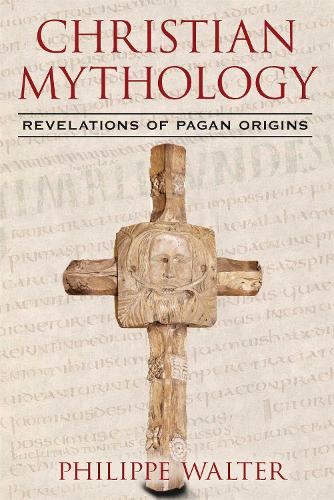
Christian Mythology: Revelations of Pagan Origins
(Paperback, 2nd Edition, New Edition of Christianity: Origins of a Pagan Religion)
Publishing Details
Christian Mythology: Revelations of Pagan Origins
By (Author) Philippe Walter
Foreword by Claude Lecouteux
Inner Traditions Bear and Company
Inner Traditions Bear and Company
20th November 2014
2nd Edition, New Edition of Christianity: Origins of a Pagan Religion
United States
Classifications
General
Non Fiction
230
Physical Properties
Paperback
224
Width 152mm, Height 229mm, Spine 18mm
315g
Description
Reveals how Christian mythology has more to do with long-standing pagan traditions than the Bible
Explains how the church fathers knowingly incorporated pagan elements into the Christian faith to ease the transition to the new religion
Identifies pagan deities that were incorporated into each of the saints
Shows how all the major holidays in the Christian calendar are modeled on pagan rituals and myths, including Easter and Christmas
In this extensive study of the Christian mythology that animated Europe in the Middle Ages, author Philippe Walter reveals how these stories and the holiday traditions connected with them are based on long-standing pagan rituals and myths and have very little connection to the Bible. The author explains how the church fathers knowingly incorporated pagan elements into the Christian faith to ease the transition to the new religion. Rather than tear down the pagan temples in Britain, Pope Gregory the Great advised Saint Augustine of Canterbury to add the pagan rituals into the mix of Christian practices and transform the pagan temples into churches. Instead of religious conversion, it was simply a matter of convincing the populace to include Jesus in their current religious practices.
Providing extensive documentation, Walter shows which major calendar days of the Christian year are founded on pagan rituals and myths, including the high holidays of Easter and Christmas. Examining hagiographic accounts of the saints, he reveals the origin of these symbolic figures in the deities worshipped in pagan Europe for centuries. He also explores how the identities of saints and pagan figures became so intermingled that some saints were transformed into pagan incarnations, such as Mary Magdalenes conversion into one of the Celtic Ladies of the Lake.
In revealing the pagan roots of many Christian figures, stories, and rituals, Walter provides a new understanding of the evolution of religious belief.
Reviews
Walter writes in a distinguished academic tradition that goes back to Jesse L. Weston and Sir James Frazier. He describes a rich complex of pagan, European traditions that inform Christian ritual. In doing so, he illuminates beliefs that underlie some of our most cherished stories and practices. I will recommend this book to my students. * Steve Harris, associate professor of English, University of Massachusetts *
It is generally understood that Christianity strengthened its position early on in the popular mind by usurping and bending pagan rituals and sacred locales. In this ambitious scholarly treatise, professor of medieval French literature Walter marries the pagan and Christian calendars in great detail by examining ancient myths, saints, and celebrations. He visits All Saints Day, the Twelve Days of Christmas, Candlemas, Easter, Ascension, St. Johns Day of Summer, St. Peters Chains Day, and St. Michaels Day to find that these yearly rounds, roughly 40 days apart, share a mythical realm with the dates of Carnival, best understood as a religion--it was even the religion preceding Christianity. Walters sources include acts of councils, confessors manuals, literary texts such as Arthurian romances, hagiographic works, and medieval iconography. While he doesnt attack Christianity on its spiritual merits, he concludes boldly that Christianity would have had no chance of imposing itself in the West if, on certain points of dogma and rites, it had not responded to the religious needs of the converted pagans. . . . This volume makes a strong scholarly contribution to understanding the evolution of belief, where it is important to understand that nothing has been lost or created. * Publishers Weekly *
Author Bio
Philippe Walter is a professor of medieval French literature at the Universit Stendhal in Grenoble. He has published numerous books about the Middle Ages and has overseen the editing and translation of the Grail romances for the prestigious Bibliothque de la Pliade. He lives in France.
